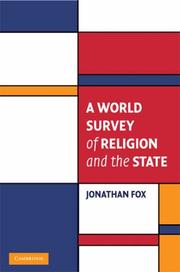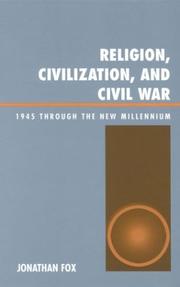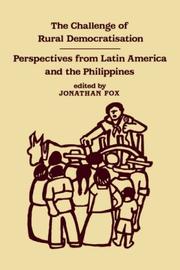| Listing 1 - 10 of 50 | << page >> |
Sort by
|

ISBN: 9780521707589 9780521881319 9780511993039 9780511415128 0511415125 0521881315 0521707587 9780511413742 0511413742 0511414447 9780511414442 051199303X 9786611751111 6611751114 1107184940 1281751111 0511412827 0511411901 Year: 2008 Publisher: Cambridge New York Cambridge University Press
Abstract | Keywords | Export | Availability | Bookmark
 Loading...
Loading...Choose an application
- Reference Manager
- EndNote
- RefWorks (Direct export to RefWorks)
This book delves into the extent of government involvement in religion between 1990 and 2002 using both quantitative and qualitative methodology. The study is based on the Religion and State dataset, which includes 175 governments across the globe, all of which are addressed individually in this book. The forms of involvement examined in this study include whether the government has an official religion, whether some religions are given preferential treatment, religious discrimination against minority religion, government regulation of the majority religion, and religious legislation. The study shows that government involvement in religion is ubiquitous, that it increased significantly during this period, and that only a minority of states, including a minority of democracies, have separation of religion and state. These findings contradict the predictions of religion's reduced public significance found in modernization and secularization theory. The findings also demonstrate that state religious monopolies are linked to reduced religious participation.
Political philosophy. Social philosophy --- Christian church history --- anno 1900-1999 --- Religion and state --- World politics --- Religion et Etat --- Politique mondiale --- History --- Histoire --- Religion and politics --- -Religion and politics --- -World politics --- -322 --- Colonialism --- Global politics --- International politics --- Political history --- Political science --- World history --- Eastern question --- Geopolitics --- International organization --- International relations --- Politics, Practical --- Politics and religion --- Religion --- Religions --- State and religion --- State, The --- -History --- -Godsdienstige tolerantie. Godsdienstpolitiek --- Religious aspects --- Political aspects --- 322 Godsdienstige tolerantie. Godsdienstpolitiek --- Godsdienstige tolerantie. Godsdienstpolitiek --- 322 --- Social Sciences --- Sociology --- Religion and state - History - 20th century --- Religion and politics - History - 20th century. --- World politics - 1989 --- -Religion and state
Book
ISBN: 9780415676328 9780415676311 0415676320 0415676312 9780203094419 Year: 2013 Publisher: New York: Routledge,
Abstract | Keywords | Export | Availability | Bookmark
 Loading...
Loading...Choose an application
- Reference Manager
- EndNote
- RefWorks (Direct export to RefWorks)
Religion and politics. --- Religion et politique --- Religion and politics --- 322 --- Political science --- Politics, Practical --- Politics and religion --- Religion --- Religions --- 322 Godsdienstige tolerantie. Godsdienstpolitiek --- Godsdienstige tolerantie. Godsdienstpolitiek --- Religious aspects --- Political aspects
Book
ISBN: 1281160601 9786611160609 019152610X 1435633849 0191607266 Year: 2007 Publisher: Oxford ; New York : Oxford University Press,
Abstract | Keywords | Export | Availability | Bookmark
 Loading...
Loading...Choose an application
- Reference Manager
- EndNote
- RefWorks (Direct export to RefWorks)
How can the seeds of accountability ever grow in authoritarian environments? Embedding accountability into the state is an inherently uneven, partial and contested process. Campaigns for public accountability often win limited concessions at best, but they can leave cracks in the system that serve as handholds for subsequent efforts to open up the state to public scrutiny. This book explores the how civil society ""thickens"" by comparing two decades of rural citizens' struggles to hold the Mexican state accountable, exploring both change and continuity before, during, and after national elect
Political participation --- Civil society --- Peasants --- Social capital (Sociology) --- Rural development --- Political activity. --- Citizen participation. --- Mexico --- Rural conditions. --- Community development, Rural --- Development, Rural --- Integrated rural development --- Regional development --- Rehabilitation, Rural --- Rural community development --- Rural economic development --- Agriculture and state --- Community development --- Economic development --- Regional planning --- Capital, Social (Sociology) --- Sociology --- Peasantry --- Agricultural laborers --- Rural population --- Marks (Medieval land tenure) --- Villeinage --- Citizen participation --- Social aspects

ISBN: 0739151525 9780739151525 0739107445 9780739107447 9780739112779 0739112775 Year: 2004 Publisher: Lanham, Md. Lexington Books
Abstract | Keywords | Export | Availability | Bookmark
 Loading...
Loading...Choose an application
- Reference Manager
- EndNote
- RefWorks (Direct export to RefWorks)
"In Religion, Civilization, and Civil War Jonathan Fox carves out a new space for research and interrogation in conflict studies. Covering over five decades, this study provides the most comprehensive and detailed empirical analysis of the impact of religion and civilization on domestic conflict to date and will become a critical resource for both international relations and political science scholars."--BOOK JACKET.
Civil war --- Ethnic conflict --- Religion - General --- Religion --- Philosophy & Religion --- Conflict, Ethnic --- Ethnic violence --- Inter-ethnic conflict --- Interethnic conflict --- Ethnic relations --- Social conflict --- Civil wars --- Intra-state war --- Rebellions --- Government, Resistance to --- International law --- Revolutions --- War --- Religious aspects --- History --- 291.16 --- 27 "19" --- 27 "19" Histoire de l'Eglise--20e eeuw. Periode 1900-1999 --- 27 "19" Kerkgeschiedenis--20e eeuw. Periode 1900-1999 --- Histoire de l'Eglise--20e eeuw. Periode 1900-1999 --- Kerkgeschiedenis--20e eeuw. Periode 1900-1999 --- 291.16 Verhouding tussen de godsdiensten. Verdraagzaamheid. Interreligieuze dialoog --- Verhouding tussen de godsdiensten. Verdraagzaamheid. Interreligieuze dialoog
Book
ISBN: 1108801919 1108773176 1108488919 1108807860 Year: 2020 Publisher: Cambridge : Cambridge University Press,
Abstract | Keywords | Export | Availability | Bookmark
 Loading...
Loading...Choose an application
- Reference Manager
- EndNote
- RefWorks (Direct export to RefWorks)
This book is among the most thorough and comprehensive analysis of the causes of religious discrimination to date, complete with detailed illustrations and anecdotes. Jonathan Fox examines the causes of government-based religious discrimination (GRD) against 771 minorities in 183 countries over the course of twenty-five years, while offering possible reasons for why some minorities are discriminated against more than others. Fox illustrates the complexities inherent in the causes of GRD, which can emerge from secular ideologies, religious monopolies, anti-cult policies, security concerns and more. Western democracies tend to discriminate more than Christian-majority countries in the developing world, whether they are democratic or not. While the causes of GRD are ubiquitous, they play out in vastly different ways across world regions and religious traditions. This book serves as a method for better understanding this particular form of discrimiation, so that we may have the tools to better combat it and foster compassion across people of different religions and cultures.
Religious discrimination. --- Discrimination --- Religious minorities --- Religion and state. --- Religion and politics. --- Ethnic conflict --- Secularism --- Government policy. --- Religious aspects. --- Political aspects. --- Ethics --- Irreligion --- Utilitarianism --- Atheism --- Postsecularism --- Secularization (Theology) --- Political science --- Politics, Practical --- Politics and religion --- Religion --- Religions --- State and religion --- State, The --- Minorities --- Religious aspects --- Political aspects
Book
ISBN: 1316547590 1316547264 1316547922 1316548252 1316549577 1316459500 1107133068 110758972X 1316545288 9781316459508 9781316549575 9781107133068 9781107589728 9781107133068 9781107589728 Year: 2016 Publisher: New York, NY
Abstract | Keywords | Export | Availability | Bookmark
 Loading...
Loading...Choose an application
- Reference Manager
- EndNote
- RefWorks (Direct export to RefWorks)
Religious discrimination is the norm in many countries around the world, and the rate is rising. Nearly every country which discriminates does so unequally, singling out some religious minorities for more discrimination than others. Religious tradition does not explain this complex issue. For example, Muslim majority states include both the most discriminatory and tolerant states in the world, as is also the case with Christian majority states. Religious ideologies, nationalism, regime, culture, security issues, and political issues are also all part of the answer. In The Unfree Exercise of Religion Jonathan Fox examines how we understand concepts like religious discrimination and religious freedom, and why countries discriminate. He makes a study of religious discrimination against 597 religious minorities in 177 countries between 1990 and 2008. While 29 types of discrimination are discussed in this book, the most common include restrictions in places of worship, proselytizing, and religious education.
Freedom of religion. --- Religious discrimination. --- Religious minorities. --- Religion and state. --- State and religion --- State, The --- Minorities --- Discrimination --- Freedom of religion --- Freedom of worship --- Intolerance --- Liberty of religion --- Religious freedom --- Religious liberty --- Separation of church and state --- Freedom of expression --- Liberty --- Religious aspects --- Law and legislation
Book
ISBN: 131630972X 1139924613 1316289052 1107076749 1107433916 Year: 2015 Publisher: Cambridge : Cambridge University Press,
Abstract | Keywords | Export | Availability | Bookmark
 Loading...
Loading...Choose an application
- Reference Manager
- EndNote
- RefWorks (Direct export to RefWorks)
This book examines 111 types of state religion policy in 177 countries between 1990 and 2008. Jonathan Fox argues that policy is largely a result of the competition between political secular actors and religious actors, both of which try to influence state religion policy. While there are other factors that influence state religion policy and both the secular and religious camps are divided, Fox offers that the secular-religious competition perspective provides critical insight into the nature of religious politics across the globe. While many states have both increased and decreased their involvement in religion, Fox demonstrates that states which have become more involved in religion are far more common.
Religion and state --- Religion and politics --- Secularism --- Ethics --- Irreligion --- Utilitarianism --- Atheism --- Postsecularism --- Secularization (Theology) --- Political science --- Politics, Practical --- Politics and religion --- Religion --- Religions --- State and religion --- State, The --- Political aspects --- Religious aspects

ISBN: 0714634085 Year: 1990 Publisher: London : Cass,
Abstract | Keywords | Export | Availability | Bookmark
 Loading...
Loading...Choose an application
- Reference Manager
- EndNote
- RefWorks (Direct export to RefWorks)
Peasants --- Political participation --- Rural development --- Political activity --- Political aspects
Book
Year: 2003 Publisher: New Paltz, N.Y. Tusutale Publishing
Abstract | Keywords | Export | Availability | Bookmark
 Loading...
Loading...Choose an application
- Reference Manager
- EndNote
- RefWorks (Direct export to RefWorks)
Acting --- Drama --- toneeltechniek --- improvisatie --- dramatische expressie
Digital
ISBN: 9781107589728 9781107133068 9781316459508 Year: 2018 Publisher: Cambridge Cambridge University Press
Abstract | Keywords | Export | Availability | Bookmark
 Loading...
Loading...Choose an application
- Reference Manager
- EndNote
- RefWorks (Direct export to RefWorks)
Sociology of minorities --- Sociology of religion --- Human rights --- anno 1990-1999 --- anno 2000-2009
| Listing 1 - 10 of 50 | << page >> |
Sort by
|

 Search
Search Feedback
Feedback About UniCat
About UniCat  Help
Help News
News